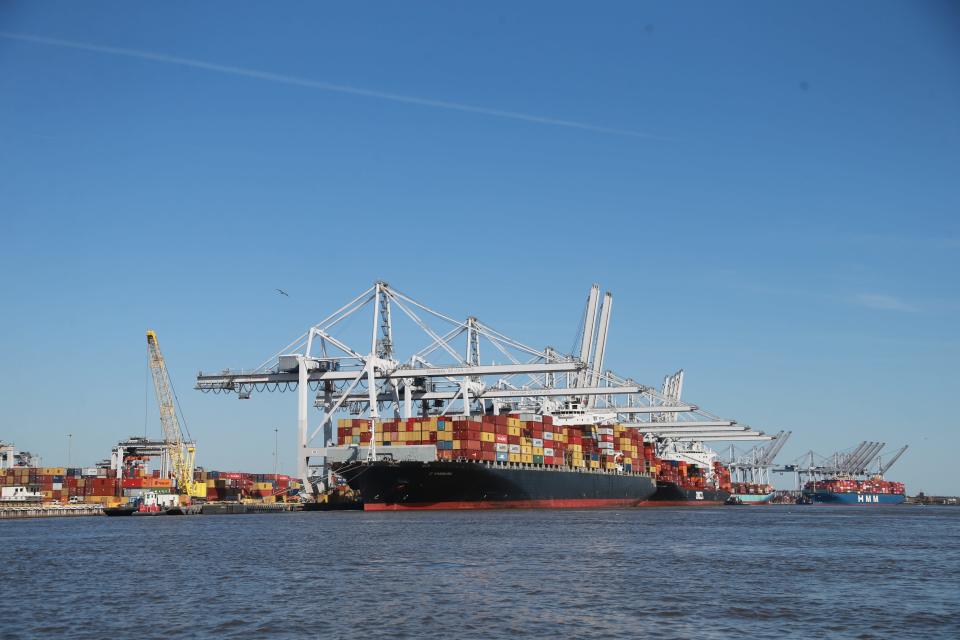GSU Economic Monitor: Savannah economy slows but still stronger than pre-COVID pandemic
Based on Georgia Southern University’s Coastal Empire Economic Monitor newsletter, the regional economy continued to slow during the third quarter like much of the national economy as the Federal Reserve raised interest rates in an effort to avoid a recession.
But it's no time to panic, according to Michael Toma, professor of economics at GSU.
“I think what we’re looking at is probably relatively modest growth until probably the midpoint of the year, and it’s still not entirely clear when that recession is going to happen."
Toma predicts the national recession will occur somewhere mid-year, between the second and third quarters of 2023. “But I think Savannah has got sufficient insulation from a downturn because of all the other things that are happening in the economy, because of port growth and development and logistics and warehousing and manufacturing.”

Although the local business forecasting index fell for the second consecutive quarter, mainly from "weakness" in the housing and labor markets, employment overall proved vigorous. According to the Economic Monitor, Metro Savannah employers topped 200,000 workers for the first time with 200,600 workers.
"This is 3.6% higher than year-ago employment and 5% higher than the pre-pandemic peak in early 2020," Toma said.
Here's a deeper look at industry numbers and what they have to tell us:
Georgia Ports Authority sees decrease in activity
In a press release dated Dec. 13, the Georgia Ports Authority (GPA) revealed a 6.2% decrease in activity in November 2022 when compared to November 2021.
Edward Fulford, manager of communications for GPA, attributed the dip in port volumes to three key factors:
"The first is the reopening of the nation's economy, with increased consumer spending on services rather than goods. It should be noted that this shift in spending will constitute a reallocation of funds within the broader economy," he said.
Increasing inflation had a "domino effect on container demand," he added, and Tropical Storm Nicole closed the Savannah River channel for three days.
"Still, our performance constitutes significant growth compared to our pre-pandemic volumes," wrote Fulford. "We expect to continue processing more than 450,000 TEUs per month through the end of our fiscal year in June 2023 — greater than 17% higher than our monthly average in 2019."
The decrease in traffic did offer a silver-lining. GPA Director Griff Lynch said the vessel queue reduced by 17 container ships, and the full backlog is expected to clear by early January.
Even with the slight decrease in traffic, the logistics industry added 1,000 workers during the third quarter, bringing the total of employees supporting port activity to more than 18,000.

Tourism and hospitality workforce continues recovery
Tourism and hospitality numbers were mixed. Boardings at Savannah-Hilton Head International Airport increased by 3.5%, but hotel/motel tax receipts dropped 6% and car rental taxes fell by 5.2%. Employment in the hospitality sector remained below pre-pandemic levels, but only slightly, with nearly 27,000 workers.
Some of the contraction in hospitality hiring is due to a tight labor market that has more competition for entry-level jobs, explained Toma. "But, I also believe that the hospitality industry is making do with efficiency gains from its workforce... Many of us remember the days when our [hotel] room was cleaned every single day. That changed with COVID. Many establishments now have adopted a practice of room service on request... So, if you're not cleaning every single room, every single day, you can make do with fewer staff."
'This is where they're coming': 'This is where they're coming': Rincon officials excited for future with Hyundai, region growth
Housing market cooling but valuations hold steady
Permits pulled for single-family home construction fell another 12% in the third quarter after a 19% drop during the second quarter, according to the Monitor.
Single-family home valuations, however, increased slightly from $282,700 to $291,600. The rub, though, is "after accounting for inflation, this [increase] represents a 4% decline in terms of true purchasing cost."
Average rents in the Savannah area remain high, with one-bedroom units topping $1,700 a month, according to Rent.com.

Manufacturing jobs climbing steadily
Within the next two to three years, manufacturing will rival the education, business/professional, and education/health sectors as a top employers Manufacturing industries now employ more than 18,800 workers, a 4.5% year-over-year growth. That will number will only soar with the Hyundai Metaplant manufacturing facility bringing in 8,000 workers online between 2023 and 2025 — and its ripple effects will continue.
"So, even if we take a conservative estimate of about 4,000 supplier jobs," said Toma, "it's quite possible that our manufacturing base by 2025-2026 could be 30,000."

Wages playing 'catch-up'
Although there was a 20% increase in unemployment claims between the second and third quarters, the seasonally adjusted unemployment rate dropped from 2.7% to 2.6%.
Private sector wages throughout the metro area hovered around $26 an hour, 15% higher than in 2021. When adjusted for inflation, wages are 5.5% higher, which means Savannahians have slightly more buying power, but there's a caveat, according to Toma.
"Bear in mind the recent history on this: While the rest of the nation was seeing significant wage gains in 2021, Savannah was lagging behind. Our wages were flat," he said.
Stabilizing ForcesLooming recession signals transition to sustainable growth for Savannah's regional economy
GSU Economic Monitor:Second Quarter growth slows but ports, tourism offers help to possible recession
"So, in a sense, this is almost like a catch-up. And, it might not seem that way, because we've seen grocery costs increase, fuel costs spiked, and now they're kind of trending back down."
Where consumers are caught, however, is in the automobile market. "Automobile costs have far outpaced any gains we've seen in wages. It doesn't help somebody who's in the market for a car and needs to have a car right now," Toma said.
Projecting continued growth ahead
Toma sounded sanguine about the region's long-term future, however, even amid the sturm and drang portrayed by some in the national media. As he put it, “So, if you can imagine, we’re on an upward slope in terms of growth for the last couple of years. You know, hiking over the top of the plateau, and then we’re level for a while, and then the trail will continue hiking upwards toward the latter half of the year.”
Amy Paige Condon is a local editor for Savannah Morning News. You can reach her at ACondon@gannett.com.
This article originally appeared on Savannah Morning News: Economic Monitor says Savannah economy slows amidst recession fears
